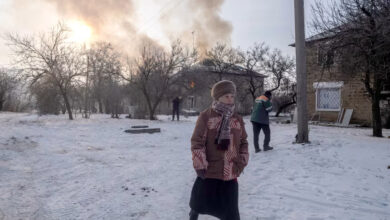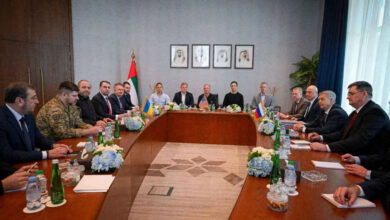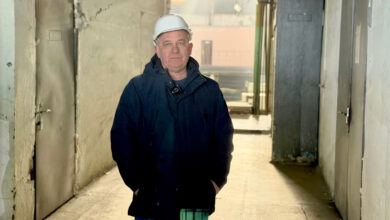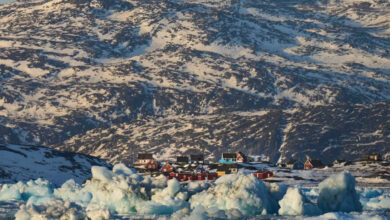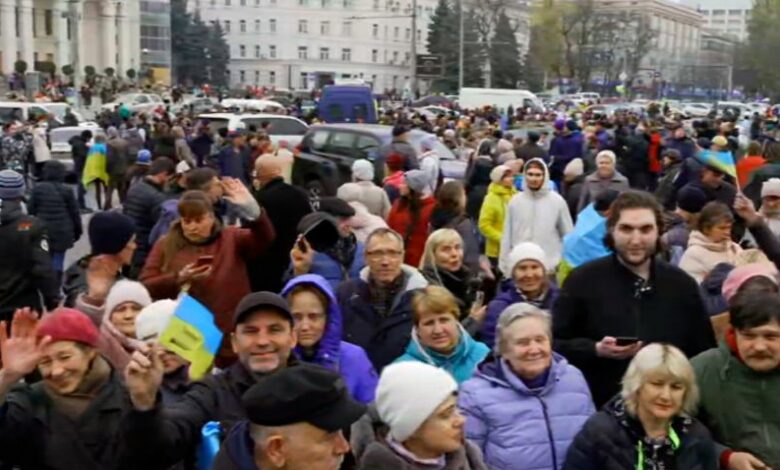
The residents have no water, no internet connection and little power. But as a CNN crew entered the city on Saturday, the mood was euphoric.
As the crew filmed live in Kherson’s central square, some in the crowd of locals sang the national anthem while others shouted “Slava Ukrayini!” – glory to Ukraine, a patriotic greeting.
“We feel free, we are not slaves, we are Ukrainians,” resident Olga told CNN.
Locals have also been climbing onto the tops of the buildings, including the cinema, in the square to erect Ukrainian flags. Soldiers driving through are greeted with cheers and asked to sign autographs on flags.
Back when Russian troops rolled in at the beginning of the war, this was a city that tried to resist: people were taken away, tortured, disappeared, residents said.
“We were terrified by [the] Russian army, we were terrified by soldiers that can come any moment in our house, in our home – just open the door, like they are living here, and steal, kidnap, torture,” Olga said.
But now, people flock to the central square in the newly liberated city, wrapped in Ukrainian flags, singing and chanting “Freedom for Ukraine.”
“Everyone here is out celebrating in the square here. People are wearing the Ukrainian flag, they’re hugging the soldiers, they’ve come out to see what it’s like to have freedom,” Robertson said.
Katerina described the liberation as the “best day” of her life after eight months under Russian occupation. “Our town is free, my street is free,” she told CNN.
Another local resident named Andrew said he was so glad to see Ukrainian soldiers.
“I think lots of people were killed here. We just don’t know that yet,” he said of the period under occupation.
A Ukrainian Special Forces soldier, who gave his name only as Daniel, told CNN how his unit was the first to arrive in Kherson. “My commander put the flag on the top of the building,” he said.
“It was a real blast for us, finally. Before the 11th [of November], it was five days of hard work, real hard work. Ukrainian soldiers, as always, just confirmed again that they are stronger than the Russians.”
He added that the civilians in Kherson are the “real heroes” for lasting so long under Russian occupation. “I can’t imagine how happy they are right now,” he said.
The CNN team appeared to be the first international journalists to reach Kherson city center since it changed hands in the past 48 hours.
On Friday, Russia announced it had withdrawn from the west bank of the Dnipro River in the strategic southern region of Kherson, leaving the regional capital of the same name and surrounding areas to the Ukrainians.
The retreat represents a major blow for Putin’s war effort in Ukraine. Kherson was the only Ukrainian regional capital that Russian forces had captured since February’s invasion. Their withdrawal east across the Dnipro cedes large swathes of land that Russia has occupied since the early days of the war, and that Putin had formally declared as Russian territory just five weeks ago.
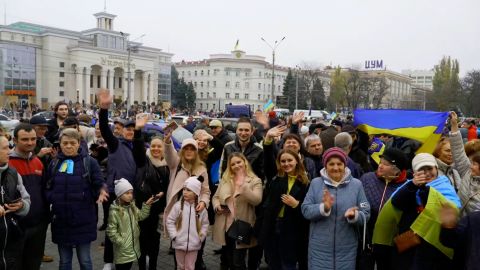
“It was a really hard time for everyone. Every Ukrainian family waited for our soldiers, for our army,” another Kherson resident told CNN on Saturday, recalling Russia’s months-long occupation.
The woman said it felt “amazing” to see Ukrainian troops in Kherson.
“We felt every day your support, thank you so much,” the woman added, before hugging Robertson.
Efforts to return the city to ‘normal life’
Ukrainian authorities are working to return the city to “normal life,” the head of the regional military administration, Yaroslav Yanushevich, said Saturday in a video message, adding that the city, oblast and district military administrations had arrived in the city and started duties.
“The national police and the security service of Ukraine have also taken up their duties. The State Service for Emergency Situations is clearing mines. We are working for the return of the city to normal life,” Yanushevich said.
About 200 police officers are currently working in the city, Ukraine’s National Police said in a statement Saturday.
“Roadblocks have been set up around and in the territory of Kherson. The regional police continue to record the crimes of the Russian occupiers,” the statement reads.
The main threat is from mines, police said, adding that explosives technicians were working on their detection and disposal. “One of the police sappers was injured today during the demining of an administrative building in Kherson,” police said.
Residents who have left Kherson are advised “not to rush to return until stabilization measures are completed,” police said.
Speaking Saturday on the next steps for the Ukrainian military, CNN military analyst Cedric Leighton said: “This is going to be a major urban operation. What you are going to see is a methodical operation to clear buildings of potential booby traps and mines.
“Another thing that the Ukrainians will have to do is they’re going to have to move their systems forward so that they can counter any possible Russian artillery that is going to be on the eastern bank of the Dnipro River.
“You can see that the Ukrainians have moved to that river bank, they are now controlling that area, they will have to mop up some remaining Russian forces that did not make it out of the west bank of the Dnipro River. But those that are there will probably either surrender or in essence be eliminated from the fight.”
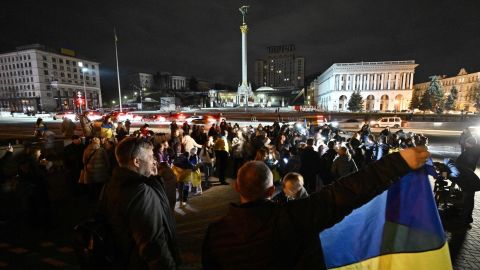
On Friday evening, Ukraine’s President Volodymyr Zelensky posted a nighttime video of celebrations in the city, where a crowd was waving flags and chanting “ZSU,” the Ukrainian acronym for the armed forces.
Earlier that day, the Ukrainian military’s southern operational command said Russian forces had been “urgently loading into boats that seem suitable for crossing and trying to escape” across the river.
It was unclear whether all Russian troops had left Kherson and the wider region. Serhiy Khlan, a member of Ukraine’s Kherson regional council, said the city was “almost under the control of the Armed Forces of Ukraine” but cautioned that some Russian troops might have remained behind in civilian clothing.
He warned that many Russian troops “threw away their military uniforms, and are now hiding with civilian clothes on.”
CNN’s Nic Robertson reported from Kherson and Amy Woodyatt wrote from London. CNN’s Sophie Tanno, Jorge Engels, Dennis Lapin, Radina Gigova, Mick Krever, Anna Chernova, Teele Rebane, Gianluca Mezzofiore and Tim Lister contributed to this report.

